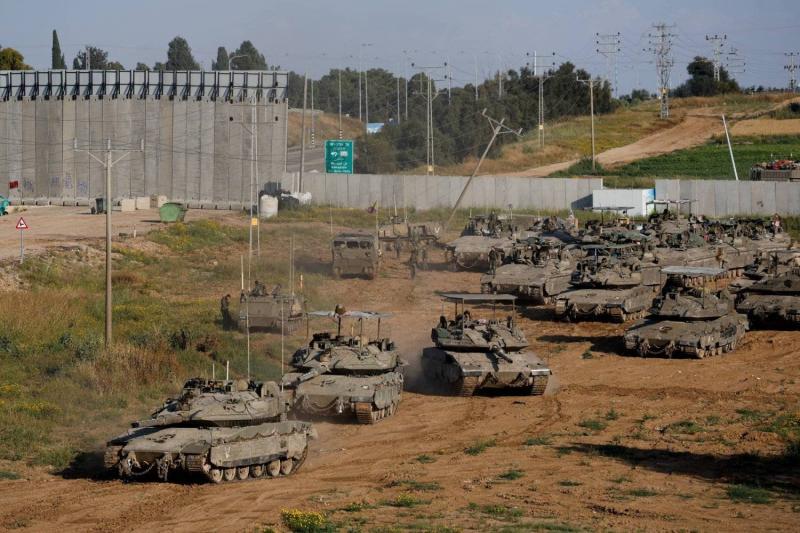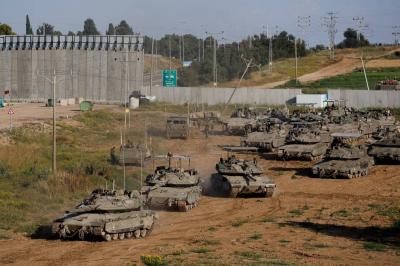Since the outbreak of the war in the Gaza Strip between the Israeli army and Hamas, Hezbollah and Israel have been exchanging fire almost daily, with the exchanges intensifying in recent weeks. What are the implications of this escalation? Will Israeli forces invade Lebanon once again following calls from the Israeli government coalition to urgently restore security to the northern parts of the country?
#### Escalation on the Border
In recent weeks, exchanges of gunfire between Israel and Hezbollah have escalated, with the latter intensifying its attacks and the Israeli army conducting deeper airstrikes within Lebanese territory. Hezbollah has raised its attacks using drones and missiles, hitting significant Israeli military facilities. Israel has also increased its strikes, targeting Hezbollah sites deep in the Beqaa Valley in southern Lebanon, as well as senior military officials in the group.
This fighting, which is considered the fiercest between Hezbollah and Israel since their war in 2006, has forced tens of thousands of people to flee their homes on both sides of the border. Over the course of eight months of mutual escalation, at least 458 people have been killed in Lebanon, including 90 civilians, according to a count by Agence France-Presse, among the dead are about 300 Hezbollah fighters. The Israeli side reported 15 military personnel and 11 civilians killed.
#### "Heat on the Border"?
On Wednesday, Israeli Prime Minister Benjamin Netanyahu declared that his country is "prepared to launch a very intensive operation" along the border with Lebanon to "restore security" to northern Israel, where the escalation with Hezbollah has driven tens of thousands to leave their homes. Netanyahu’s far-right allies, National Security Minister Itamar Ben Gvir and Finance Minister Bezalel Smotrich, called for immediate action to restore security in northern Israel.
Consequently, military and strategic expert, Brigadier General Ismail Abu Ayoub, observes several indicators of an "expected firing up of the Israeli-Lebanese front." There are "Israeli preparations" for an extensive confrontation with Hezbollah as part of a "major Israeli response", following heightened threats from Israeli officials about launching a military operation in Lebanon, according to his statements to Al-Hurra.
Given the failure to achieve "military objectives" in Gaza, Israel is likely to aim to maintain its "dignity" using "deterrent force,” and thus a large Israeli military operation in Lebanon is expected soon, according to Abu Ayoub.
#### A New Invasion?
In 1982, Israeli forces invaded Lebanon and besieged Beirut to expel the Palestine Liberation Organization led by the late President Yasser Arafat, but the departure of Palestinian fighters led to the emergence of Israel's adversary, Hezbollah. In 2006, Hezbollah and Israel fought a devastating war that resulted in the deaths of 1,400 individuals, 1,200 of whom were on the Lebanese side, mostly civilians. Israeli strikes in 2006 flattened large areas of Hezbollah-controlled suburbs south of the capital, destroyed Beirut airport, and bombed roads, bridges, and other infrastructure. Nearly a million people fled their homes in Lebanon, while 300,000 Israelis vacated their residences to escape Hezbollah's rockets, leading to the destruction of about 2,000 houses.
Israeli military and strategic expert Kofi Lavi points out that "a new invasion of Lebanon is closer than ever," amid "unprecedented Israeli preparations." The Iranian regime is pushing Hezbollah to "escalate with Israel" to "ignite the region," which would "destabilize security and stability in Lebanon," he told Al-Hurra.
Hezbollah's attacks on Israel imply that "an Israeli military escalation against Lebanon is unavoidable," and the Israeli forces are capable of "invading Lebanese territories and completely destroying Hezbollah’s arsenal," according to a former Israeli army officer.
In turn, Lebanese military and strategic expert, retired Brigadier General Khalil Helou, believes there has been "an actual war of attrition occurring for 8 months on the border between Israel and Lebanon." The war has inflicted severe and grievous damage on Lebanon, with 65 southern villages seeing destruction ranging from 60 to 70 percent, displacing 100,000 Lebanese from the south, in addition to agricultural losses estimated at 4 billion dollars, he stated to Al-Hurra. Approximately 100,000 Israelis have left their homes in northern Israel, but the losses on the Lebanese side "are much higher," according to Helou.
#### What About Hezbollah?
Israel has long regarded Hezbollah as the most significant threat on its borders, feeling intense concern over its increasing arsenal and its foothold in Syria. However, Helou emphasizes that Hezbollah "does not want to reach a wide confrontation with the Israeli army," while Israel "is eager and ready to wage war on Lebanon."
The Lebanese military and strategic expert points to "indicators" suggesting that Hezbollah "does not wish for a wide war," as it has neither fired a bullet nor a missile at Israeli gas fields and oil platforms, even though they "are within the range of its weapons." Hezbollah has not used the "precision missiles" it possesses to target Israel, despite their capability to strike "all Israeli territories and strategic targets within Israel," according to Helou.
However, he highlights a "notable escalation" in the pace and number of daily operations carried out by Hezbollah against Israel. The average number of Hezbollah operations against Israel in previous months was eight per day, but recently has exceeded twelve daily, occasionally reaching fourteen. Yet, these operations are "replies to Israeli strikes," indicating that "the initiative on the ground lies with the Israeli side," according to the Lebanese military and strategic expert.
#### Impacts of the "Expected Confrontation"?
The Israeli army ranks 17th among the most powerful armies globally, while the Lebanese army ranks 118th, according to Global Firepower. However, Hezbollah, established by the Iranian Revolutionary Guard in 1982 and classified by the United States as a "terrorist organization," possesses "a massive arsenal" estimated between 135,000 and 150,000 missiles and shells, or more, with a range of over 300 kilometers, allowing it to reach targets in deep Israel.
Hezbollah is believed to have between 100 to 400 recently upgraded and guided missile systems, according to military experts' assessments. The party also possesses precision munitions, drones, anti-tank missiles, and missiles aimed at aircraft and ships. In 2021, Hezbollah leader Hassan Nasrallah claimed that the group had 100,000 fighters. The CIA's World Factbook estimated in 2022 that the number of fighters was about 45,000, divided between roughly 20,000 regulars and 25,000 reserve forces.
Consequently, military and strategic expert, Major General Samir Farag, dismisses the likelihood of a significant escalation in confrontations between Israel and Hezbollah or an Israeli invasion of Lebanese territories. Israel "will not take the risk" of expanding the conflict with Hezbollah, which has thus far only used 10 percent of its capabilities, according to his statements to Al-Hurra.
Hezbollah has 160,000 missiles and multi-role drones and can launch 3,000 to 4,000 missiles at Israeli territories weekly, with around 6,000 fighters capable of combat both above ground and through tunnels, the Egyptian military and strategic expert emphasizes. He sees the confrontation with Hezbollah as challenging for Israel because it cannot fight on two fronts simultaneously, while the Gaza front remains open; the Israeli military has not achieved any tangible accomplishments in eight months of war. Therefore, Israel "will not risk entering southern Lebanon," stresses Major General Farag.
On the other hand, Abu Ayoub predicts that Israeli forces will invade Lebanese territories, leading to a "full-blown confrontation between the Israeli army on one side and Hezbollah and Iran-affiliated militias on the other." Hezbollah differs from Hamas as it "does not exist in a confined area," but southern Lebanon has various natural obstacles, complicating the Israeli military's task there, according to the military and strategic expert.
He points out that Hezbollah's weaponry is "greater and more advanced" than that of Hamas, making the Israeli army's losses likely to be "significant on both military and civilian fronts."
Lavi confirms that "Israel possesses precise information about Hezbollah's capabilities and its arsenal of weapons, along with its sponsors and supporters." There are unexpected Israeli surprises for Hezbollah coming soon, while the Lebanese army is akin to a "developed police force," and therefore does not intimidate or concern Israel, according to the former Israeli military officer.
#### A Broader Conflict in the Region?
Iran-backed groups in the Middle East form what is called the "Resistance Axis," a coalition of armed militias that include Hezbollah in Lebanon, the Islamic Jihad and Hamas movements in Gaza, the Houthis in Yemen, and several armed groups in Iraq and Syria, which act as Iran's frontline defense.
Should Israel invade Lebanese territories, Iran could indirectly become involved in the war through "the participation of Iranian militias in the conflict," suggesting that the United States would also enter the fray, according to Helou. In such a scenario, Iran-loyal fighters might flow into Lebanese territory through Syria, and there is "U.S. pressure" on Israel to prevent this, as the Lebanese military and strategic expert affirms.
He indicates that if U.S. pressures on Israel weaken, "an Israeli invasion" could occur, at which point there may be a "prior American-Iranian understanding" to pressure Hezbollah to prevent "the expansion of the conflict."
Israel does not care about "eliminating Hezbollah," but rather aims to push the party away from its borders by 5 to 10 kilometers to avoid "direct rockets from the party" in order to create a buffer zone, as Helou points out.
He states: "If Iran and the U.S. come to an understanding, the American side will pressure Israel to keep the military operation in Lebanese territory limited." However, without an Iranian-American understanding, "the door will be wide open" for broader regional conflicts due to Iran's direct involvement, as Hezbollah is "Iran's crown jewel," and Tehran will not accept Israel destroying the party or stripping it of its capabilities, according to Helou.




